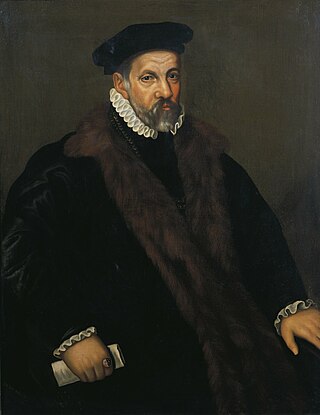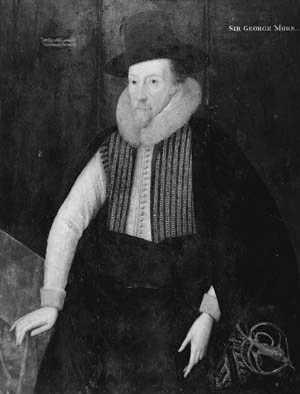
Sir Edward Montagu of Boughton, Hanging Houghton and Hemington in Northamptonshire was an English lawyer and judge in the time of Henry VIII and Edward VI. He was Chief Justice of the King's Bench from 1539 to 1545 and Chief Justice of the Common Pleas from 1545 to 1553.
This is a list of sheriffs and high sheriffs of the English county of Rutland.

Thomas Wilson (1524–1581), Esquire, LL.D., was an English diplomat and judge who served as a privy councillor and Secretary of State (1577–81) to Queen Elizabeth I. He is remembered especially for his Logique (1551) and The Arte of Rhetorique (1553), which have been called "the first complete works on logic and rhetoric in English".

John Harington, 1st Baron Harington of Exton in Rutland, was an English courtier and politician.
Sir Richard Sackville of Ashburnham and Buckhurst in Sussex and Westenhanger in Kent; was an English administrator and Member of Parliament.
Elizabeth Paulet was an English noblewoman, the daughter of John Paulet, 2nd Marquess of Winchester of Basing, Hampshire and his first wife Elizabeth Willoughby.
Sir Kenelm Digby (1603–1665) was an English courtier, diplomat and Roman Catholic intellectual.

Sir William Courtenay of Powderham in Devon was a prominent member of the Devonshire gentry. He was Sheriff of Devon in 1579–80 and received the rare honour of having been three times elected MP for the prestigious county seat (Devon) in 1584, 1589 and 1601.

Sir William Courtenay was a landowner in Devon and de jure 2nd Earl of Devon. He was the son of George Courtenay and Catherine, daughter of Sir George St Ledger of Annery. He succeeded his grandfather Sir William Courtenay, of Powderham in 1535. He was knighted in 1553 and MP for Plympton in 1555.

Sir George More was an English courtier and politician who sat in the House of Commons at various times between 1584 and 1625.
Lewis Watson, 1st Baron Rockingham was an English landowner and politician who sat in the House of Commons from 1621 to 1624. From 1621 to 1645 when he received his peerage he was known as Sir Lewis Watson, 1st Baronet. He supported the Royalist cause in the English Civil War and for his services was created Baron Rockingham in 1645.
Sir Ralph Hopton, of Witham, Somerset, was an English courtier and politician. He was the son of a member of the Hopton family and Agnes Haines.
Sir Thomas White was an English politician.
Dorothy Kitson, later Dorothy, Lady Pakington, was the daughter of Sir Thomas Kitson, a wealthy London merchant and the builder of Hengrave Hall in Suffolk. Her first husband was Sir Thomas Pakington, by whom she was the mother of Queen Elizabeth I's favourite, Sir John "Lusty" Pakington. After Sir Thomas Pakington's death, she married Thomas Tasburgh. She was one of the few women in Tudor England to nominate burgesses to Parliament and to make her last will while her husband, Thomas Tasburgh, was still living. Her three nieces are referred to in the poems of Edmund Spenser.
Sir John Digby of Eye Kettleby, near Melton Mowbray, Leicestershire, was Knight Marshal for King Henry VIII.
Sir Arthur Hopton, of Witham, Somerset, was an English politician. He was member of parliament for Dunwich in 1571, and for Suffolk in 1589. He was made a Knight of the Bath at the coronation of King James I.

John Strode, the son of Robert Strode of Parnham, Dorset and Elizabeth Hody, was elected MP for Dorset in 1572 and was Sheriff of Dorset from 1572 to 1573.

St Andrew's Church is a church in Stoke Dry, Rutland. It is a Grade I listed building.
Sir Thomas Throckmorton (1539-1607) was an English landowner and local politician.
![<span class="mw-page-title-main">Edward Watson (died 1617)</span> MP for [[Stamford (UK Parliament constituency)]] (c. 1549–1617)](https://upload.wikimedia.org/wikipedia/commons/thumb/b/b6/WatsonRockinghamArms.svg/320px-WatsonRockinghamArms.svg.png)
Sir Edward Watson of Rockingham, Northamptonshire was an English landowner and politician. He was Sheriff of Northamptonshire from 1591 to 1592, was elected MP for Stamford in 1601 and was knighted in 1603.








![<span class="mw-page-title-main">Edward Watson (died 1617)</span> MP for [[Stamford (UK Parliament constituency)]] (c. 1549–1617)](https://upload.wikimedia.org/wikipedia/commons/thumb/b/b6/WatsonRockinghamArms.svg/320px-WatsonRockinghamArms.svg.png)